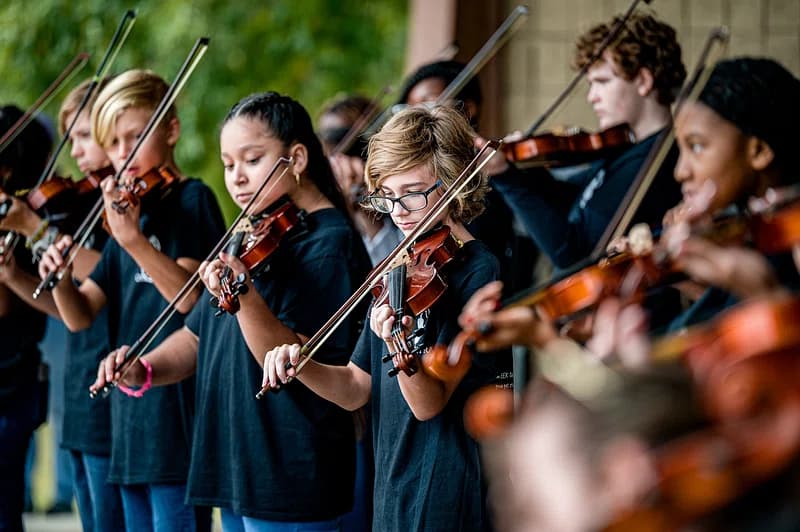
MusicTweens 9-12
The Melodic Journey: Unveiling the Lifelong Benefits of Teaching Kids to Play a Musical Instrument
Introduction:
As parents, we constantly strive to provide our children with activities that enhance their mental, social, and emotional development. One such endeavor that has proven to be exceptionally fruitful is teaching kids to play a musical instrument. The world of music offers numerous benefits that extend far beyond the realm of art. From fostering creativity and enhancing cognitive abilities to improving social skills and boosting self-confidence, the joys of learning a musical instrument are immeasurable. In this article, we delve into the captivating world of music and explore how different musical instruments cater to the personalities of children aged 9-12, known as Tweens.
The Universal Language of Music:
Music is often referred to as the universal language, as it has the ability to communicate emotions and feelings that transcend cultural barriers. When children learn to play a musical instrument, they are exposed to a diverse range of melodies, rhythms, and harmonies, helping them develop a deeper appreciation and understanding of different cultures. This exposure instills a sense of empathy and open-mindedness, enabling children to embrace the beauty of diversity.
Piano: Harmonizing Precision and Delicacy
The piano, with its rich and versatile sound, is an excellent choice for children who possess a sense of precision and delicacy. The instrument demands focused attention, coordination, and disciplined practice, providing an ideal foundation for developing concentration skills. By learning to play the piano, children enhance their finger dexterity, hand-eye coordination, and fine motor skills. The piano's wide range of notes allows children to explore various genres of music, from classical to jazz, further expanding their musical horizons.
Guitar: Strumming the Strings of Creativity
For children who radiate creativity and possess a free-spirited personality, the guitar is a perfect fit. This instrument offers immense freedom for expression and experimentation, allowing children to create their own unique melodies. The guitar fosters improvisation skills, enabling children to explore different chords and strumming techniques. With its portability, the guitar also encourages social interaction as young musicians can easily gather and perform together, forming bands or jamming sessions that nurture collaboration and teamwork.
Violin: The Eloquent Melody of Discipline
The violin, often considered one of the most challenging instruments to master, attracts children who exhibit determination, discipline, and a flair for elegance. Learning to play the violin requires perseverance, as it demands accurate intonation, precise bowing technique, and a keen ear for pitch. By practicing the violin regularly, children develop resilience, patience, and the ability to overcome obstacles. Furthermore, the violin's expressive sound allows young musicians to convey their emotions through delicate and passionate melodies, fostering emotional intelligence and self-expression.
Drums: The Rhythm of Energy and Confidence
For children who possess abundant energy, a strong sense of rhythm, and an innate desire to be bold, the drums provide an avenue for boundless expression. Playing the drums builds physical coordination and enhances gross motor skills, as it requires simultaneous movement of both arms and legs. The instrument's dynamic nature encourages children to explore different beats and rhythms, enabling them to develop a deep sense of timing and synchronization. The drums also bolster self-confidence, as the percussive sounds produced create a powerful and impactful presence, instilling a sense of pride and accomplishment in young musicians.
Flute: The Serenade of Tranquility and Poise
The flute, known for its soothing and ethereal tones, resonates with children who radiate tranquility and seek harmony. Learning to play the flute requires controlled breath and delicate finger movements, facilitating relaxation and mindfulness. The instrument encourages deep breathing techniques, contributing to stress reduction and emotional well-being. The flute's enchanting melodies offer a sense of serenity and peace, providing children with an outlet for emotional expression and introspection.
Lifelong Benefits and Future Well-being:
The benefits of teaching children to play a musical instrument extend far beyond their childhood years. Engaging in a musical hobby not only brings immense joy and fulfillment but also contributes to their mental and social well-being throughout their lives. Scientific research has shown that playing a musical instrument enhances cognitive abilities, including memory, problem-solving skills, and mathematical aptitude. Moreover, the perseverance and discipline cultivated through music education are transferable skills that assist children in overcoming challenges in various aspects of life.
Furthermore, playing a musical instrument provides a platform for social interaction and builds a strong sense of community. By participating in ensembles, orchestras, or bands, children develop teamwork skills, learn to listen and adapt, and forge lasting friendships. The confidence gained through performing in front of an audience nurtures self-assurance and public speaking skills, which prove invaluable in professional and personal settings.
Conclusion:
The journey of teaching children to play a musical instrument is a gift that keeps on giving. From the piano's precision to the guitar's creativity, the violin's discipline to the drums' energy, and the flute's tranquility, each musical instrument caters to different personality traits, ensuring an enjoyable and fulfilling experience for every child. Beyond the childhood years, the benefits of music continue to enrich the mental, social, and emotional well-being of individuals, fostering a lifelong passion and appreciation for the power of music. So, let us unlock the melodies within, and witness the transformative impact of music on our children's lives.
MusicTweens 9-12
Keywords:
After schoolEducation